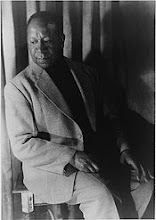Danny Simmons is a contemporary, self-proclaimed, “neo-African abstract expressionist” painter as well as an author and television producer (Def Poetry Jam). Hailing from Queens, NY, he is a co-founder of Rush Galleries and co-founder and vice president of the Rush Philanthropic Arts Foundation. He graciously granted Les Amis an interview about Beauford and the Beauford Delaney work that is part of his private art collection.
************
Les Amis: When and how did you learn about Beauford Delaney?
DS: I learned about Delaney's work about ten years ago at the black fine art show...one of the older established galleries had a few pieces for sale...I was intrigued by his abstraction. ..at the time I’d only seen figurative work by many of the artists of that period.
Les Amis: How would you describe his work?
DS: Well the work I’m most familiar with is mostly expressionist abstraction. I admit I’m not that well versed on his whole body of work. But in some of his figurative work I admire that he incorporated African images into the paintings . . . also his use of paint . . .how he thickly applied it . . . his portraits were soulful and captured the essence of his subjects.
Portrait of the Artist’s Mother
(1930) Pencil, ink and watercolor on paper
© Estate of Beauford Delaney,
by permission of Derek L. Spratley, Esquire,
Court Appointed Administrator
Les Amis: You are a “neo-African abstract expressionist” painter. What does this mean?
DS: What I meant when I coined that term many years ago is that I try to channel the intent and spiritual feeling of traditional African art and allow it to influence the abstract images that I paint. African art was created for social and religious reasons and invoked power. I try to infuse that same spiritual power into my work.
Les Amis: How much did Beauford’s work influence yours, if any?
DS: I was already on my artistic path when I encountered his work . . . but the freedom and depth I saw in Delaney's art helped to push me to relax a bit more with my painting and find a deeper voice from within to bring to the canvas.
Portrait of the Artist’s Mother (detail)
(1930) Pencil, ink and watercolor on paper
© Estate of Beauford Delaney,
by permission of Derek L. Spratley, Esquire,
Court Appointed Administrator
Les Amis: Have you used any of Beauford’s work as part of the arts education programs that you offer at Rush Philanthropic Arts Foundation?
DS: I don’t believe the kids have used Delaney specifically but I am aware that they have looked at art from that period by artists of color. And I’m sure he was among them.
Les Amis: How did you come to obtain the portrait of Beauford’s mother?
DS: A great collector dealer friend of mine told me he had a client that wanted to sell a Delaney that was within my affordability. Beauford’s work is quite pricey. I was hoping for an abstraction but was pleasantly surprised when I saw the stunning portrait of his mother. I pulled the resources together and quickly purchased it before someone else snapped it up.
Les Amis: What drew you to this work?
DS: I was drawn to purchase his work for two reasons:
Les Amis: Is there a “certain something” that motivates an artist (yourself included) to create abstract rather than figurative works?
DS: I think abstraction is a drawing on one’s soul to create the work. It’s a powerful experience to create something that comes totally from your spirit and imagination.
Les Amis: Do you think it is significant that Beauford continued to paint figurative portraits as he produced more and more abstract expressionist paintings?
DS: I think that artists have the ability to move across the creative spectrum and I admire that Beauford was able to allow himself the freedom to do so.
Les Amis: Any final thoughts?
DS: Only that I’m honored to be one of a very small group in the world that is lucky enough to have some of his work.
Les Amis: When and how did you learn about Beauford Delaney?
DS: I learned about Delaney's work about ten years ago at the black fine art show...one of the older established galleries had a few pieces for sale...I was intrigued by his abstraction. ..at the time I’d only seen figurative work by many of the artists of that period.
Les Amis: How would you describe his work?
DS: Well the work I’m most familiar with is mostly expressionist abstraction. I admit I’m not that well versed on his whole body of work. But in some of his figurative work I admire that he incorporated African images into the paintings . . . also his use of paint . . .how he thickly applied it . . . his portraits were soulful and captured the essence of his subjects.
(1930) Pencil, ink and watercolor on paper
© Estate of Beauford Delaney,
by permission of Derek L. Spratley, Esquire,
Court Appointed Administrator
Les Amis: You are a “neo-African abstract expressionist” painter. What does this mean?
DS: What I meant when I coined that term many years ago is that I try to channel the intent and spiritual feeling of traditional African art and allow it to influence the abstract images that I paint. African art was created for social and religious reasons and invoked power. I try to infuse that same spiritual power into my work.
Les Amis: How much did Beauford’s work influence yours, if any?
DS: I was already on my artistic path when I encountered his work . . . but the freedom and depth I saw in Delaney's art helped to push me to relax a bit more with my painting and find a deeper voice from within to bring to the canvas.
(1930) Pencil, ink and watercolor on paper
© Estate of Beauford Delaney,
by permission of Derek L. Spratley, Esquire,
Court Appointed Administrator
Les Amis: Have you used any of Beauford’s work as part of the arts education programs that you offer at Rush Philanthropic Arts Foundation?
DS: I don’t believe the kids have used Delaney specifically but I am aware that they have looked at art from that period by artists of color. And I’m sure he was among them.
Les Amis: How did you come to obtain the portrait of Beauford’s mother?
DS: A great collector dealer friend of mine told me he had a client that wanted to sell a Delaney that was within my affordability. Beauford’s work is quite pricey. I was hoping for an abstraction but was pleasantly surprised when I saw the stunning portrait of his mother. I pulled the resources together and quickly purchased it before someone else snapped it up.
Les Amis: What drew you to this work?
DS: I was drawn to purchase his work for two reasons:
- To expand my collection of African-American masters.
- I’m still hoping to find an abstraction I can afford, but to have such a prominent historical artist in my home is a real blessing. His life in Paris is an amazing story.
Les Amis: Is there a “certain something” that motivates an artist (yourself included) to create abstract rather than figurative works?
DS: I think abstraction is a drawing on one’s soul to create the work. It’s a powerful experience to create something that comes totally from your spirit and imagination.
Les Amis: Do you think it is significant that Beauford continued to paint figurative portraits as he produced more and more abstract expressionist paintings?
DS: I think that artists have the ability to move across the creative spectrum and I admire that Beauford was able to allow himself the freedom to do so.
Les Amis: Any final thoughts?
DS: Only that I’m honored to be one of a very small group in the world that is lucky enough to have some of his work.






No comments:
Post a Comment